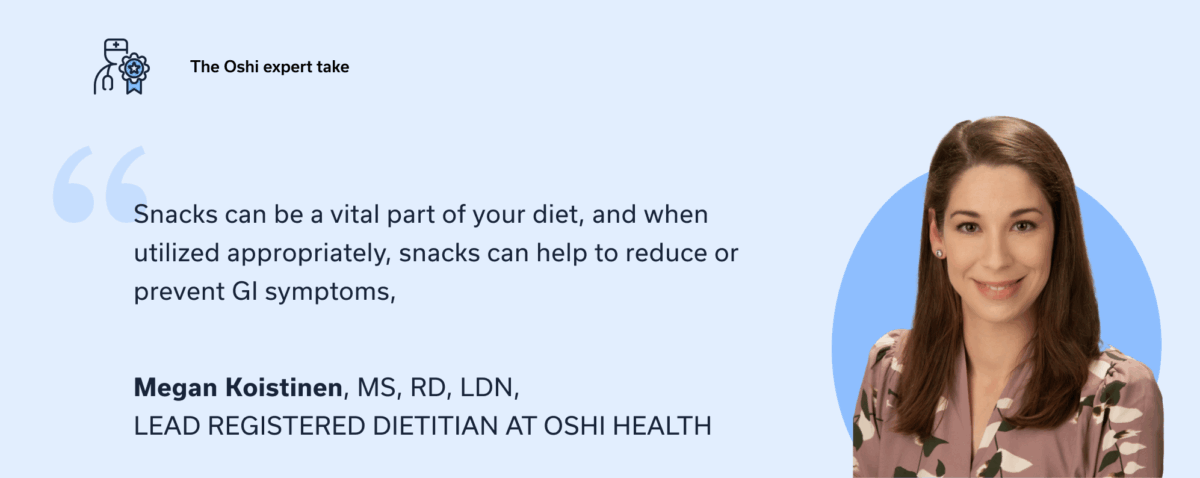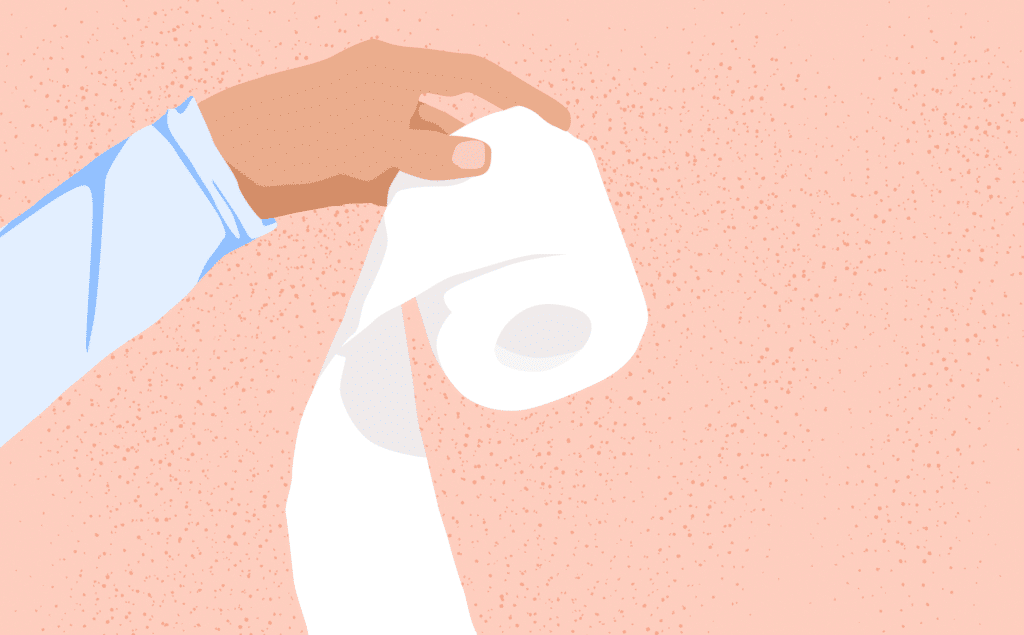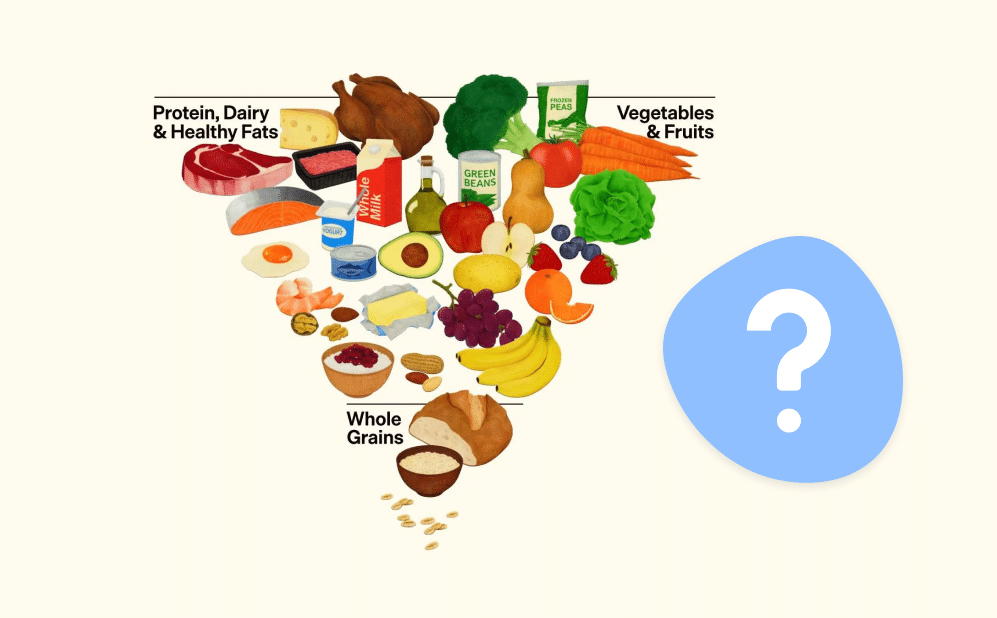Snacking gets a bad rap, especially for people living with GI issues. But when done mindfully, snacking can actually support digestion and help meet your nutritional needs. It can also prevent you from getting overly hungry (which can lead to overeating and symptom flare-ups), and can even promote gut motility throughout the day. But what are the best snacks for acid reflux, IBS, and overall gut health? That depends on your unique conditions, triggers, and tolerances. That said, there are some general guidelines to follow.
Raise your hand if you’ve ever dived into a midday or late-night snack attack. Most likely, we all have our hands raised (I, for one, am a frequent snacker day and night). Too often, mainstream media or even healthcare providers tell us to avoid snacks, associating the practice with poor food choices. There is some truth to this if our snacking is happening right before bed when we’re not able to digest optimally, or we’re enjoying a few too many chocolates or other non-nutritious snacks throughout the work day. For those of us who struggle with GI conditions, the best snacks for acid reflux, GERD, IBS, or other issues can be an even more complicated question—and merits extra attention and planning.
“Snacks can be a vital part of your diet, and when utilized appropriately, snacks can help to reduce or prevent GI symptoms,” explains Megan Koistinen, MS, RD, LDN, a lead registered dietitian at Oshi Health. However not all snacks are created equal, and determining the right choices when you have a GI condition can be tricky, so we sat down with Koistinen and a few other experts to unpack the best snacks for overall gut health, and for conditions like acid reflux and irritable bowel syndrome (IBS).

Understanding the connection between snacks and GI health
Snacks themselves are neither good nor bad—and over 90% of us snack regularly. That same study found healthy snacks provide important nutrients and energy, as well as regulating appetite. When snacks like candy or chips were chosen, study participants felt more hungry by the next meal, experienced difficulty managing weight, and reported more spikes in their energy levels. I don’t know about you, but I’d rather be in that first group, which means opting for nutrient-dense snacks (i.e. vegetables, fruits, nuts, and seeds). Ideally, these snacks should be minimally processed as well.
If you have a gastrointestinal condition, snacking is a bit more complicated than just opting for whole foods. But Koistinen points out an extra benefit for those with certain GI conditions: Snacking can improve gut motility, which is when your digestive system works successfully to move food from your mouth to your intestines to break that food down. After food is broken down, nutrients can be absorbed, and any waste moves out of your body. If you experience motility difficulties, things won’t run as smoothly, and this can cause pain and GI discomfort.
Where snacks come in: Since snacks provide smaller portions of food throughout the day than meals, they are easier for the GI system to break down—yes, even if you have a GI condition or symptoms. The end result? Snacking can help ensure you get enough nutrients, along with fewer uncomfortable GI symptoms like cramping and abdominal pain, so long as you eat the best snacks for you.
Snacking with IBS
When someone has IBS, their GI system is highly sensitive to normal gut functions, like abdominal contractions or passing gas. This sensitivity often causes uncomfortable or even painful sensations in the stomach. While IBS flares can stem from many triggers, the ones we’re focusing on today are eating foods you don’t tolerate well, or eating too much—that’s where healthy snacking comes in.
“Snacking can help you to avoid overloading the GI tract with food that might trigger bloating or discomfort,” explains Koistinen, noting this is especially important for those with IBS since bloating and discomfort are two common symptoms.
Another thing that’s important for IBS? Snacking on healthful, easy-to-digest foods, like those with small amounts of soluble fiber. Soluble fibers that are snack-worthy include cantaloupe, honeydew, nut butters, and baby carrots. “Fiber also plays an important role in managing IBS symptoms,” says Koistinen, “But when eaten in larger amounts, this can lead to a number of symptoms. I often recommend focusing on small amounts of fiber spread throughout the day, like with small frequent snacks.”

Best snacks for IBS relief
There are some tried-and-true snacks that can help with IBS. Chelsea McCallum, APD, a dietitian specializing in IBS, often recommends lactose-free yogurt and nuts like pecans and walnuts as solid snack options for those with IBS.
She also notes that low FODMAP fruits and vegetables can offer a fiber boost, including:
- Blueberries
- Cantaloupe
- Carrot sticks
- Edamame (up to 1/2 cup)
- Kiwi
- Pineapple
- Raspberries (10 raspberries or less)
- Snow peas (up to five pods)
- Yellow bananas (as opposed to spotty ones)
Fiber is a great way to stay full, but protein helps us feel satiated as well. If someone is looking for a IBS-friendly snack with some protein, McCallum recommends:
- Cottage cheese (in small amounts, or not at all if lactose triggers your IBS symptoms)
- Greek yogurt (opt for a lactose-free choice if lactose triggers your IBS symptoms)
- Rice cakes topped with peanut butter and bananas
- Smoked salmon
- Tuna
You don’t need to consider your trigger foods 100% off-limits, either. “Often, after we work to identify trigger foods, we can work to identify the volume that can be tolerated,” Koistinen explains. “Many times we can still have some of our favorite foods that may be triggers but in smaller amounts perfect for snacking.”
Snacks to avoid for IBS
Triggers are personal, so snacks that should be avoided for IBS differ from person to person. That said, there are some common culprits that may trigger symptoms in many people, such as fried foods, spicy foods, and snacks that are high in fat.
McCallum adds a few additional snacks most individuals with IBS may want to avoid:
- Crackers, chips, and dips that contain onion and garlic
- Foods with inulin, a fiber additive that can cause symptoms commonly associated with IBS
- Products that contain xylitol or sorbitol, two sweeteners that cause gut discomfort
Snacks for heartburn
Many of us have experienced heartburn from time to time. Maybe you overdid it on an acidic beverage like lemonade or ate a heavier meal, only to feel an unpleasant burning in your chest (aka heartburn, which is a symptom of acid reflux). If acid reflux happens chronically, it’s referred to as gastroesophageal reflux disease (GERD).
“Having small snacks throughout the day is often a strategy we recommend to manage heartburn symptoms,” says Koistinen, “The larger the portion of food, the more likely you are going to stretch your stomach, which can increase the chance of stomach acid making its way into the esophagus. By keeping portions small, or snacking, it can help to reduce that risk.”
Unfortunately, that doesn’t mean a smaller portion of fries or mini cupcakes are GERD-friendly snacks. You still want to make smart snacking choices; Koistinen adds that low fat and non-acidic foods often work best.
Best snacks for acid reflux and GERD
“Snacking on foods that are easy to digest, such as complex carbs and lean proteins, can help keep reflux symptoms in check,” says Molly Pelletier, MS, RD, CDN, a dietitian specializing in acid reflux. Some of her go-to favorites include:
- A slice of turkey or grilled chicken with whole grain crackers
- Banana slices with 1-2 tablespoons of almond butter
- Carrot sticks or cucumber slices with a mashed avocado dip
- Dried apricots with pumpkin seeds
- Homemade trail mix with dried nuts, dried edamame, popcorn, and whole grain cereal
- Oatmeal with flax meal and a drizzle of maple syrup
Pelletier notes that any snack that is naturally low in acidity and soothing for the stomach is a great option. Bonus points if it also provides some lean protein or fiber.

Snacks to avoid for acid reflux
What snacks should you avoid if you’re experiencing an acid reflux flare or managing a GERD diagnosis? Pelletier warns against foods that are highly acidic. High-fat snacks, spicy snacks, and carbonated beverages also make the list of foods to avoid or enjoy in limited quantities. Koistinen adds that minty snacks may also aggravate GERD and acid reflux symptoms.
Popular foods that fall into one (or more) of these categories include:
- Carbonated drinks
- Chips
- Fried food
- Grapefruit
- Lemons
- Mint-flavored gum or snacks
- Oranges
- Pastries
- Salsa
- Sparkling water
How to get rid of acid reflux with better snacking habits
While the list of foods to eat with acid reflux is a helpful tool, there’s more to snacking than just what to snack on. Quantity matters, too. “Having frequent snacks could be helpful in reducing the volume of food your digestive tract needs to process at one time, which can help prevent acid reflux symptoms from flaring,” explains Koistinen.
Snacks for general digestive health
Even if you don’t have heartburn or IBS, snacks can still be a value-add for your diet. Some of Pelletier’s recommended snacks for overall gut health include:
- Apple slices with almond butter: Apples contain pectin, which supports digestion.
- Avocado on whole grain or sourdough toast: This combo provides fiber and healthy fats.
- Kefir or fermented foods: Yogurt is the most common, but any foods in this group will introduce beneficial probiotics into the gut.
- Vegetable sticks with guacamole: This snack is packed with fiber and the guac adds healthy fats.
When to snack to maximize tolerance
When you snack matters, too. Koistinen recommends avoiding eating too close to meals, as this can overload your digestive system. In an ideal world, snacks should be enjoyed a few hours before or after a meal. Snacking after 11pm isn’t a great idea either, since this may lead to a higher risk of diabetes mortality, and/or a difficulty maintaining a healthy weight.
You’ll also want to pay attention to your snack portions—especially if you’re eating while doing something else, like scrolling TikTok or catching up on a favorite TV show. If you’re multi-tasking, put your snacks in a bowl or on a plate instead of eating from the package to avoid overeating.
When to seek medical advice
Changing the way you snack can be helpful in managing your symptoms, but finding lasting relief for persistent GI issues might require additional support. A GI dietitian can create a tailored diet (snacking plan included) for your needs and recommend any additional lifestyle changes or treatments based on your symptoms. A primary care doctor can refer you to a dietitian or other GI provider, or you can also make an appointment with one directly.
Key takeaways
Snacking is not something you need to avoid; rather, it’s something to be intentional about. Keep in mind that:
- Snacks that are high in protein and fiber support your overall gut health and consistent energy levels.
- If you have IBS, snacking is a great way to get enough fiber, and you may even be able to tolerate certain trigger foods in small quantities. Low FODMAP fruits and veggies, as well as lean sources of protein are other great snack ideas.
- Snacks for acid reflux, GERD, and heartburn should be naturally low-acidic and soothing for your stomach. Smaller, more frequent quantities of food in general may also relieve your symptoms.
If you’re experiencing chronic or severe GI symptoms, working with a whole-person GI practice like Oshi can help you determine the best snacking options for your lifestyle, symptoms, and dietary preferences.
Frequently asked questions (FAQs)
-
Foods that are low in acidity are often helpful for acid reflux. Great options include bananas, almond butter, carrot sticks, mashed avocado dip, lean protein, and whole grain crackers.
-
Over-the-counter antacids, like Tums, are often the first line of defense when acid reflux flares up. Medications, however, aren’t the only way to immediately relieve acid reflux. Remaining upright after eating, indulging in smaller, frequent meals, and avoiding food triggers all prevent heartburn.
-
The best sweet snacks for GERD are often fruits that are naturally low in acidity. Bananas, for example, are a great option that can be enjoyed on their own, in a smoothie, or mashed up and frozen to make a healthy ice cream.
-
Whole grain crackers make the list of acid reflux and GERD snacks. However, you’ll want to avoid crackers that have added sweeteners (like animal crackers) or are high in fat. Spicy crackers are also best avoided or enjoyed in moderation.
Find lasting relief from GERD symptoms
Feel like GERD is getting in the way of enjoying your life? You’re not alone—and we’re here to help.
Oshi Health GI providers, gut-brain specialists, and registered dietitians work together to address symptoms like acid reflux and heartburn and find solutions that actually work for you.
Our GI specialists will work with you to reduce symptom flare-ups and make meal times less stressful through:
✔ Personalized care plans tailored to your lifestyle
✔ Evidence-based GERD nutrition guidance
✔ Science-backed strategies to calm your gut
✔ Compassionate, whole-person care
✔ And so much more!
Ready to take control of your GERD symptoms?










